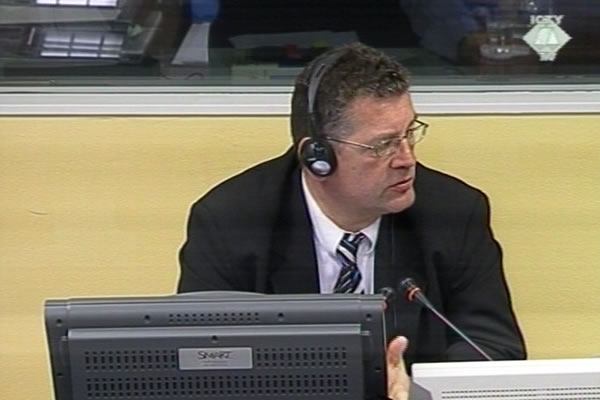Home
SECRET POLICE DID NOT INTERFERE IN POLITICS
As he was questioned by the defense, Professor Milan Milosevic claimed that in the Serbian secret service there was a ‘culture’ of non-interference in politics and avoiding illegal surveillance. Milosevic reached this conclusion based on the fact there had been no illegal surveillance scandals in the public while the accused Stanisic and Simatovic were chiefs of the Serbian State Security Service
 Milan Milosevic, defence witness of Franko Simatovic
Milan Milosevic, defence witness of Franko Simatovic Last week the prosecution began cross-examining Milan Milosevic who teaches as the Police Academy in Belgrade. Today it was decided that Jovica Stanisic’s defense would be the first to cross-examine Simatovic’s witness, in accordance with current practice. The order of the cross-examination was temporarily changed because last week the defense counsels didn’t have contact with Stanisic. It wasn’t disclosed how it happened. It is known that now the contact was reinstated.
Defense lawyer Jordash opened the hearing today with some questions about the oversight of the Serbian State Security Service’s operation, specifically about surveillance misuse. The witness repeated some claims he had made in the examination-in chief, saying there was “self-control” in place in the Service. The personnel were ‘very, very wary’ about putting people under surveillance without a court order, as they were always mindful of the 1966 case when the interior minister Aleksandar Rankovic was removed from office for illegal surveillance of President Tito. ‘In the Serbian State Security Service, there was a culture of non-interference in politics and avoiding the use of secret methods without a valid reason’, the witness said.
Asked to explain why he reached those conclusions, the professor said he had used ‘external indicators’: he ‘wasn’t aware’ of any surveillance scandals during Stanisic’s and Simatovic’s tenure. The fact that Milosevic was unaware of any scandals, presiding judge Orie noted, did not mean there weren’t any. Even if there weren’t any scandals, that might have been because surveillance incidents were covered up and the public never learned about them. Apart from saying said that ‘as a member of the public’ he couldn’t remember a single scandal, the witness refrained from commenting on the judge’s remarks.
The defense lawyer put it to the witness that apart from “self - control”that was in place in the Service, civilian bodies also oversaw operation of the Service. The witness agreed, but wasn’t able to say much about the existence of those oversight bodies. As he said, the law called for a parliamentary commission for the oversight of the Serbian State Security Service’s operation, but the witness was unable to find any information about its actual existence in the rules of procedure of the Serbian Parliament.
In a bid to downplay Jovica Stanisic’s role in the Serbian secret service, the defense counsel put it to the witness that ‘the raw reports’ submitted by rank-and-file operatives didn’t reach Stanisic if they were considered irrelevant for the protection of Serbia’s interest – even if ‘most heinous war crimes were described in them’. The witness agreed, saying that such reports ‘could bounce back and forth between lower sections in the service hierarchy’ and never reach the chief and his associates. The defense claims that Stanisic may not have known about the salaries paid to the personnel and logistical support to various recipients within the service. This included issuing weapons. Professor Milosevic agreed.
As the hearing drew to a close, prosecutor Marcus continued the cross-examination she began last week. The trial will continue tomorrow morning.
Linked Reports
- Case : Stanisic & Simatovic
- 2012-05-03 STATE SECURITY PERSONNEL HAD FICTIONAL ASSIGNMENTS IN KOSOVO WHILE THEY SERVED IN KRAJINA AND BH
- 2012-05-02 SAFEGUARDING ‘AUTONOMY’ OF SERBS OUTSIDE SERBIA
- 2012-05-01 ‘INTEGRATIVE CHARACTER’ OF MUP AND SERBIAN STATE SECURITY SERVICE
- 2012-05-09 THE ORIGINS OF ‘RED BERETS’
- 2012-05-10 IS IT LOGICAL THAT SAO KRAJINA IS PART OF SERBIA?
- 2012-05-15 PROSECUTION: SIMATOVIC INVOLVED IN SECURITY SERVICE ACTIONS IN EASTERN BOSNIA
